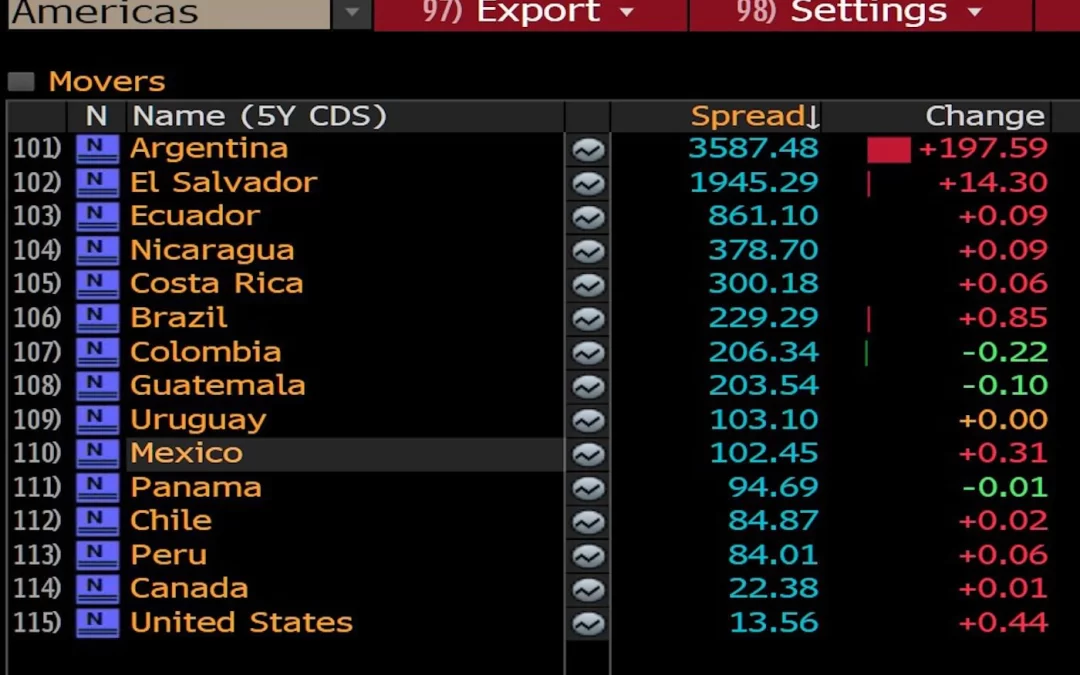When El Salvador adopted bitcoin as legal tender in September, the move received a rapturous reception from the crypto community, with many predicting a change in the debt-ridden nation’s fortunes.
Five months later, the perception of the country’s sovereign credit is four times worse than it was.
El Salvador’s five-year credit default swap (CDS) has more than quadrupled to $1,800 since early September, according to Bloomberg data shared with CoinDesk by Marc Ostwald, the chief economist and global strategist at ADM Investor Services International (ADMISI). Credit default swaps measure the cost of insuring against a country defaulting on borrowing repayments any time in a specified period.
“Salvador’s CDS is telling you a default is expected at some point,” Charlie Morris, CIO at ByteTree Asset Management said. As of Wednesday, the nation’s CDS was second highest in Latin America, behind Argentina.
While several traditional market observers were quick to call out El Salvador’s supposedly utopian decision to adopt bitcoin as legal tender and invest in the top cryptocurrency as the reason for the spike in the country’s CDS, the U.S. Federal Reserve’s hawkish turn also appears to have played a role.
Bitcoin’s adoption as legal tender
The five-year CDS almost tripled to $1,100 from $400 after El Salvador’s bitcoin law took effect Sept. 7, paving the way for citizens to pay taxes in bitcoin and use the cryptocurrency as a medium of exchange in a move that had drawn criticism from the International Monetary Fund (IMF) and the World Bank when it was proposed.
The jump probably reflected concern that the country’s negotiations with the IMF for a $1 billion loan program would founder, and priced in a greater probability of an eventual default. Since then, there’s been little to no progress in talks with the IMF over an $800 million debt repayment due January 2023. The bond was trading at over 78 cents on the dollar, offering a yield of over 35%.
“What they [El Salvador] might have to worry about is whether the IMF will come with a bailout or not because of their BTC adoption,” David Belle, founder of Macrodesiac.com and U.K. growth director at TradingView, told CoinDesk in a WhatsApp chat.
Bitcoin’s price slide
Since mid-November, El Salvador’s five-year CDS has jumped to $1,800, while bitcoin’s price has dropped nearly 40% from record highs near $69,000.
The country’s credit outlook is now exposed to bitcoin’s price gyrations because the nation holds more than 1,300 BTC and plans to issue a $1 billion, 10-year bitcoin bond this year. Bukele has been a consistent dip buyer over the past couple of months in a sign of confidence in the cryptocurrency’s long-term prospects.
“The government’s Bitcoin holdings certainly add to the risk portfolio,” Jaime Reusche, an analyst at rating agency Moody’s, told Bloomberg on Wednesday. “Trading Bitcoin is quite risky, particularly for a government that has been struggling with liquidity pressures in the past.”
According to Moody’s, the value of El Salvador’s bitcoin holdings has dropped some $10 million, and further purchases would amplify the risk. ByteTree’s Morris foresees a further rise in the CDS if bitcoin’s bear run continues, but expects little respite even if bitcoin strengthens because “El Salvador has lost friends in the IMF.”
Demand for the bitcoin bond could be tepid if the cryptocurrency remains in the clutches of the bears. That’s because the returns offered by the bond are tied to bitcoin’s price.
While Blockstream sees annualized yield on the crypto bond reaching 146% in the 10th year, the performance is conditional on bitcoin rallying to $1 million in the next five years. That’s an aggressive target, given it is currently trading near $41,800.
Selling “a decent amount of Bitcoin bonds could potentially help them with their liquidity pressures,” Moody’s Reusche told Bloomberg. But “unless Bitcoin bonds are very well received and oversubscribed, we are seeing that the probability of the need to restructure their traditional market bonds is increasing.”
High yields on the country’s dollar-denominated debt have already closed the doors to foreign bond markets. “Their 10-year USD bond has collapsed heavily, yielding about 40% now, which is insane for a sovereign bond,” Macrodesiac’s Belle said.
Fed tightening fears
Since November, the Fed has turned decidedly hawkish, signaling three rate hikes for 2022, an end to the asset purchase program in two months, and readiness to shrink its balance sheet. The Fed fund futures have baked in four quarterly rate hikes, and that has a knock-on effect for El Salvador.
“CDS appears to be spiking because of higher interest rates being priced in more and more,” Belle noted. “We’re now expecting FIVE Fed rate hikes this year.”
The debt burdens of El Salvador and other emerging nations with dollar-denominated bonds become more expensive as the Fed tightens. Thus, CDS offering insurance against potential default become costly.
Emerging markets’ sensitivity to Fed tightening is also evident from the recent spike in the JPMorgan emerging market bond spread.

El Salvador’s CDS has tripled, though as shown in the chart, it’s a very illiquid, hence the very spikey price action, ADMISI’s Ostwald said in an email. “As for other emerging markets, the picture is heavily divergent, depends on region, but the overall JPM EM Bond avg spread has drifted wider, mostly on the back of rising U.S. rate expectations.”










